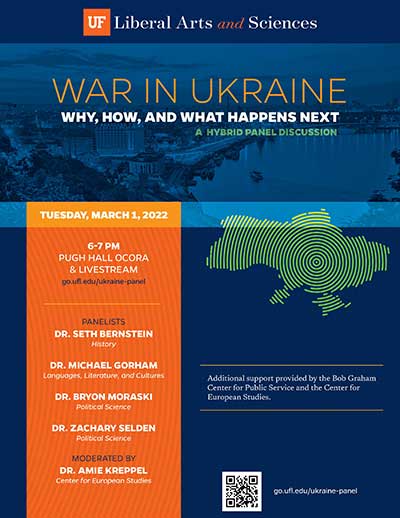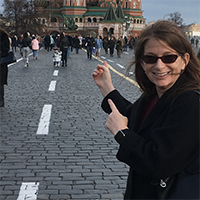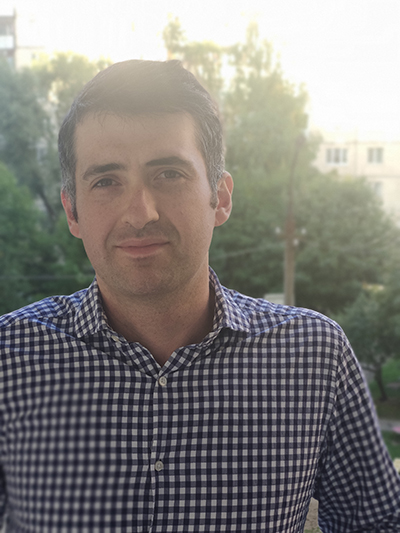
- This event has passed.
War in Ukraine: Why, How, and What Happens Next
March 1, 2022 at 6:00 pm - 7:00 pm


Panelists will discuss the current situation in Ukraine and what happens next.
Moderator:
DR. AMIE KREPPEL, European Studies, (PhD, UCLA, 1998) is a Jean Monnet Chair (ad personam) and was the founding Director of the University of Florida’s Title VI funded Center for European Studies (CES) and the European Union funded Jean Monnet Centre of Excellence. She is an Associate Professor in the Department of Political Science and the Chair of the European Union Studies Association (EUSA) from 2011-2013. Dr. Kreppel has written extensively on the political institutions of Europe in general and the European Union more specifically. Her publications include a book on the Development of the European Parliament and Supranational Party System, published by Cambridge University Press (2002) as well as articles in a wide variety of journals including Comparative Political Studies, the British Journal of Political Research, European Union Politics, the European Journal of Political Research, Political Research Quarterly, the Journal of European Public Policy and the Journal of Common Market Studies.

Panelists:
Dr. Seth Bernstein, History, (PhD, University of Toronto, 2013) is a historian of the Soviet Union and post-Soviet states. He was previously Assistant Professor of History at Higher School of Economics (Moscow). In 2017 he published Raised Under Stalin: Young Communists and the Defense of Socialism (Cornell University Press; Russian translation ROSSPEN, 2018). He translated Moscow State University Professor Alexander Vatlin’s Agents of Terror: Ordinary Men and Extraordinary Violence in Stalin’s Secret Police (University of Wisconsin Press, 2016) and Higher School of Economics Professor Liudmila Novikova’s An Anti-Bolshevik Alternative: The White Movement and the Civil War in the Russian North (University of Wisconsin Press, 2018). His digital humanities work in articles and blog posts explores how GIS and historical databases can enrich historical research. Dr. Bernstein is finishing a book called Return to the Motherland: Displaced Soviets in World War II and the Cold War (Cornell University Press, forthcoming 2023).

Dr. Michael Gorham, Languages, Literature, and Cultures, (PhD, Stanford University, 1994) is Professor of Russian Studies at the University of Florida, where he teaches language at all levels, as well as courses in literature, folklore, culture, and the Russian mass media. He received his PhD in Slavic Languages and Literatures from Stanford University. Gorham is the author of two award-winning books on language culture and politics: After Newspeak: Language Culture and Politics in Russia from Gorbachev to Putin (Cornell University Press, 2014) and Speaking in Soviet Tongues: Language Culture and the Politics of Voice in Revolutionary Russia (Northern Illinois University Press, 2003). In addition to two co-edited volumes, Digital Russia: The Language, Culture, and Politics of New Media Communication (with Ingunn Lunde and Martin Paulsen, Routledge, 2014), and a special issue of Zeitschrift für Slavische Philologie (2017, nos. 72:2–73:1) dedicated to “The Culture and Politics of Verbal Prohibition in Putin’s Russia,” he has recently published articles devoted to the political and rhetorical impact of trolls, hackers, blogging bureaucrats, tweeting presidents, dictators on Instagram, and the institutional forces attempting to reign them in.

Dr. Bryon Moraski, Political Science, (PhD, University of Iowa, 2001) focuses his research and teaching primarily on the comparative study of political institutions and elections. His latest book, Party Politics in Russia and Ukraine, leverages political developments in Russia and Ukraine to analyze the effects of major electoral system changes on the behavior of parties and legislators in countries with diverging regime trajectories. In The Regional Roots of Russia’s Political Regime (University of Michigan Press, 2017), he and Bill Reisinger use electoral politics at the national and subnational levels to understand the resurgence of authoritarianism in Russia. In Elections by Design (Northern Illinois University Press, 2006), Moraski examined the origins of subnational legislative electoral systems in Russia following the collapse of the Soviet Union.

Dr. Zachary Selden, Political Science, (PhD, UCLA, 1996) focuses on U.S. national security and alliances with an emphasis on the transatlantic relationship. His first book, Economic Sanctions as Instruments of American Foreign Policy (Praeger,1999) examines the use of sanctions and provides a framework for understanding when and why they succeed or fail in furthering American national interests. In Alignment, Alliance, and American Grand Strategy (University of Michigan Press, 2016), he examines the different forms of alliance relations that the United States maintains, and how these alliances can be leveraged to ensure American security interests at a relatively low cost. His current research focuses on the development of the intelligence community and how specific events led to the growth of its size and power.
